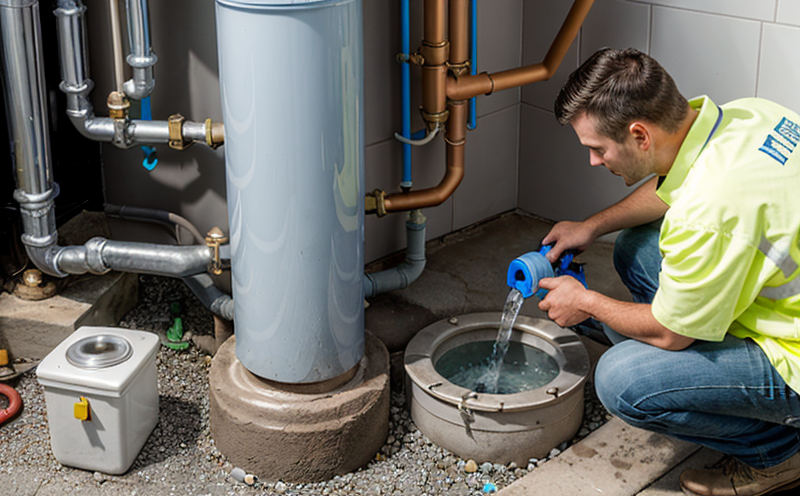ASTM D3139 Piping System Sealing Tests
The ASTM D3139 standard is a critical tool in ensuring that piping systems are capable of maintaining integrity and preventing leaks. This testing method is widely used to assess the sealing properties of flexible plastic pipe materials, particularly those used in plumbing applications.
ASTM D3139 specifies a procedure for evaluating the resistance to internal or external pressure of flexible plastic pipes intended for use as building drain, waste, vent, and soil piping. The test aims to ensure that these systems meet performance requirements under specified conditions, which is essential for the safety and reliability of plumbing installations.
The testing process involves subjecting a sample pipe to an internal or external pressure differential. This differential is applied over time, during which any leakage is measured. Leakage rates are then compared against established limits to determine if the piping system meets the required performance criteria.
For accurate and reliable results, it is crucial that the testing laboratory adheres strictly to ASTM D3139 guidelines. Proper specimen preparation includes ensuring that the pipe sample is free from defects or damage that could influence test outcomes. The environmental conditions must also be controlled to ensure consistency with the standard's requirements.
The significance of ASTM D3139 lies in its role as a benchmark for quality assurance in plumbing and water systems. By adhering to this standard, manufacturers can demonstrate compliance with industry standards and provide confidence that their products will perform reliably under specified conditions. This is particularly important given the critical nature of plumbing systems in ensuring public safety.
The testing process not only ensures product integrity but also contributes to overall quality control within manufacturing processes. By identifying potential issues early on, manufacturers can improve product design and specifications, ultimately leading to higher-quality installations. In addition, compliance with ASTM D3139 helps in maintaining a consistent level of performance across different batches of pipes, ensuring uniformity and reliability.
For those involved in the procurement or quality management of plumbing systems, understanding the importance of ASTM D3139 is vital. It provides assurance that the piping materials meet specific standards for sealing integrity, which is crucial for the longevity and safety of plumbing installations. By choosing products that have been tested according to this standard, you can help ensure the reliability and durability of your infrastructure.
Quality and Reliability Assurance
The ASTM D3139 piping system sealing tests are essential for maintaining high standards of quality assurance in plumbing applications. By adhering strictly to the specified procedures, laboratories can ensure that test results accurately reflect the performance characteristics of the pipes being evaluated.
The testing process begins with careful preparation and selection of the pipe specimens. This includes ensuring that each sample is free from defects or imperfections that could affect the outcome of the test. Once prepared, the samples are subjected to pressure differentials according to ASTM D3139 guidelines. Careful monitoring throughout this phase allows for precise measurement of any leaks.
After conducting these tests, detailed reports are generated summarizing the findings. These reports provide comprehensive data on how each sample performed under specified conditions, including peak pressures reached and observed leakage rates. Such documentation serves multiple purposes; it offers valuable insights into product performance, supports decision-making processes related to quality control, and helps identify areas for improvement.
By implementing rigorous ASTM D3139 testing protocols, laboratories contribute significantly towards enhancing overall reliability in plumbing systems. This commitment to excellence not only upholds industry standards but also fosters trust among end-users who rely on these products for their daily operations or safety needs.
Customer Impact and Satisfaction
The implementation of ASTM D3139 piping system sealing tests has a direct impact on customer satisfaction in the plumbing industry. When manufacturers follow this standard, they ensure that their products meet stringent quality requirements, leading to higher levels of trust from customers.
Clients who specify or purchase pipes tested according to ASTM D3139 can be confident that these materials have undergone rigorous evaluation for sealing integrity. This confidence translates into peace of mind knowing that the plumbing systems installed are less likely to experience leaks or other failures, thereby enhancing overall performance and reliability.
Additionally, compliance with this standard helps reduce warranty claims and service calls related to defective pipes. When there is evidence supporting the quality of materials used in a project, it becomes easier for both parties involved—manufacturers and installers—to address any issues promptly without compromising on standards.
The use of ASTM D3139 ensures that customers receive consistent results across different batches or suppliers. This consistency promotes long-term relationships between stakeholders by fostering mutual respect based on shared goals aimed at delivering superior products and services.
International Acceptance and Recognition
The ASTM D3139 piping system sealing tests are widely recognized internationally for their role in ensuring the quality of flexible plastic pipes used in plumbing applications. This standard is accepted globally due to its robustness, reliability, and comprehensive approach to evaluating sealing integrity.
Many countries have adopted ASTM D3139 as a reference document when specifying requirements for building drain, waste, vent, and soil piping systems. Its widespread acceptance stems from the fact that it provides clear guidelines on how to conduct these tests accurately and consistently across various jurisdictions.
The international recognition of ASTM D3139 also facilitates global trade by setting common benchmarks for quality assurance in plumbing materials. This uniformity allows manufacturers to export their products with confidence, knowing they meet internationally accepted standards. Similarly, importers benefit from having a standardized method for assessing product performance, reducing potential discrepancies between local regulations and international practices.
The recognition of ASTM D3139 extends beyond just the plumbing industry; it plays an important role in promoting sustainable development goals by ensuring that materials used in construction projects contribute positively to environmental sustainability. By choosing products tested according to this standard, stakeholders can support initiatives aimed at reducing waste generation and improving resource efficiency.





